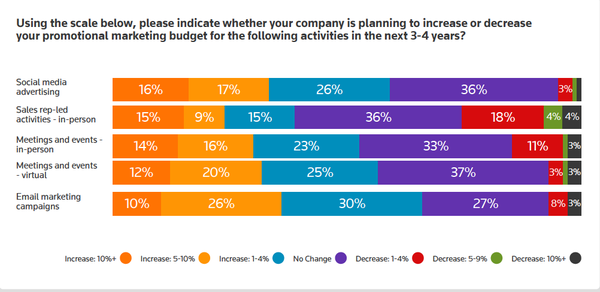
Pharma companies’ use of social
media to reach healthcare professionals (HCPs) is on the rise as artificial intelligence (AI) begins to also play a larger role, according to a survey of 246 global industry executives from Reuters
Events and Elsevier,
The study found that AI projects to engage HCPs are underway or being actively considered for use in the near future at 80% of the pharma companies studied, led by content
creation and then market research and digital marketing campaigns.
In 2024, respondents expect to allocate 42% of their promotional budgets to print, with the rest going into digital. By 2027,
the survey predicts, print’s share of budgets will have fallen to 22%.
Social media advertising will receive the biggest funding boost of any channel in the next three to four years, the
study reported, with 16% of respondents predicting budget growth of 10% or more. The reason? “Unique opportunities for targeting, engagement and community building…to engage HCPs both
before, during and after events, and as part of day-to-day marketing and medical affairs activities.”
advertisement
advertisement
But social media was only the second most likely activity to receive a budget
increase of any size. Topping that list: email marketing campaigns.
How do pharma companies use social media? The survey found social listening as the top activity, but down 10% from a year
earlier. “Connecting with physicians” was the second highest use, followed by a tie between live event/ conference support and engaging with HCP key opinion leaders/patient
influencers.
LinkedIn was the social media platform of choice for HCP engagement, the study found, because “it allows targeted promotions to drive traffic to events.” YouTube also
ranked high, aligning with where physicians congregate online, according to an Elsevier HCP survey. WhatsApp ranked third.
Denis Conlon, vice president, global marketing for Elsevier’s
Pharma and Life Sciences Solutions, explained in the report that changes in physician behavior are creating opportunities for companies to add value via social media by offering “relevant,
high-quality content and support.”
“The entry of digital-native HCPs into the workforce has created an engaged set of customers who are actively seeking information,” the
report states.
It adds, though that “time-pressed HCPs are inundated with content and overwhelmingly prefer information from independent sources over pharma companies. To cut through,
marketing and medical affairs teams need to provide HCPs with easy access to relevant, reliable and up-to-date information.
AI is now being used mostly for content creation and management,
followed by a three-way tie between digital marketing campaigns and social media analytics; market research and consumer insights analysis; and monitoring and analyzing scientific literature and
competitive intelligence.
Conlon explained that the advent of AI in medical publishing is enabling marketers and medical affairs professionals to tailor content dynamically for diverse
physician audiences. Using AI algorithms, teams can analyze complex datasets to understand and predict the unique preferences and needs of different medical specialists.
“This capability
not only enhances content relevance and engagement but also seamlessly integrates with an omnichannel marketing approach, ensuring consistent and personalized communication across various
platforms,” says Conlon. “The result is a more informed, engaged and responsive physician community, benefiting from targeted insights and information crafted to support their specific
clinical interests and patient care objectives.”
While AI is on the rise, most respondents said that less than 20% of the tools and services they provide to physicians incorporate it.
But almost 40% of them expect AI to become a core component of all major functions, with 25% saying it “will have a transformational impact and drive major shifts in strategies and
operations.”
Companies believe less than 10% of physicians are resistant to AI, which Reuters and Elsevier say is supported by HCP surveys.
Marketing and medical affairs
respondents place their highest hopes for AI in personalized HCP communication and engagement strategies, advanced analytics for understanding prescribing behaviors, and predicting patient outcomes
and optimizing treatment